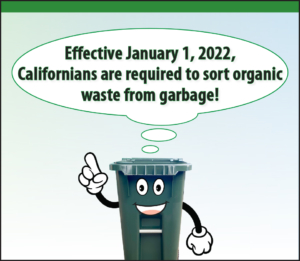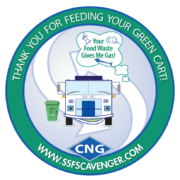ORGANIC WASTE ISN’T GARBAGE– STATE LAW REQUIRES PROPER SORTING
 California Senate Bill 1383 sets statewide targets to recover edible food and reduce disposal of organic waste in landfills. The bill aims to feed hungry people and to reduce greenhouse gas emissions. It requires the separation of organic waste like food, food-soiled paper, yard trimmings, paper, and cardboard from garbage. It applies to everyone, everywhere in California: at home, work, school, parks, venues, and events.
California Senate Bill 1383 sets statewide targets to recover edible food and reduce disposal of organic waste in landfills. The bill aims to feed hungry people and to reduce greenhouse gas emissions. It requires the separation of organic waste like food, food-soiled paper, yard trimmings, paper, and cardboard from garbage. It applies to everyone, everywhere in California: at home, work, school, parks, venues, and events.
South San Francisco Scavenger and the cities we serve are working together to educate the community and to provide appropriate services. Residents are required to subscribe to 3-cart service and to sort materials correctly. If you do not currently have a blue recycling cart or green organics cart, please contact us today!
SB 1383 was signed into law by Governor Brown in 2016 and is enforceable via local ordinance. Details of the bill can be found at www.calrecycle.ca.gov .
Residential Organics Collection Basics
Residents can recycle clean, dry paper such as junk mail, printer & notebook paper, magazines, toilet paper tubes, cereal boxes, and corrugated cardboard boxes using the blue recycling cart. These items belong under the grey lid. Items must be placed directly into cart– no liner bags. Please flatten and cut down boxes first. Large or multiple boxes can also be bundled and placed next to the blue cart for collection.
Food scraps, food-soiled paper, and yard trimming belong in the green organics cart. Peels, pits, seeds, stems, rinds, bones, skins, crusts, and all other food scraps are accepted; they can be fresh, frozen, cooked, or moldy! Greasy pizza and other paper takeout boxes, wet and food-soiled paper plates, cups, napkins and towels are accepted too. Place these items into your green cart along with yard trimmings like dry leaves, dead flowers, pulled weeds, cut grass and small branches. Paper liner bags may be used but “bio” or “compostable” plastic bags are prohibited.
After collection, materials collected from green carts will undergo anaerobic digestion at our Biogenic CNG Facility. The digestion process will create fuel for our collection vehicles and a pre-compost (or “digestate”) that will be hauled to a composting facility and transformed into a nutrient-rich soil amendment. Plastic (including “bio” or compostable varieties) inhibit the digestion process and can contaminate finished compost.
For waste reduction and sorting tips, please use our Sort Smart Recycling Guide and review our recent outreach materials.
PRO TIPS FOR FOOD WASTE COLLECTION:
Use a kitchen pail to collect food scraps and food-soiled paper. Empty the pail into your green organics cart daily. Rinse and wipe your pail clean as needed. Need a pail? We delivered one to every single-family home when the food scraps program began. Additional and replacement pails can be purchased at our office or from your favorite retailer. Newspaper and paper bags can be used to line pails or to wrap food scraps. Not a fan of kitchen pails? Try using a paper box (like for takeout meals). These can be filled with food scraps, closed, and the full box placed in your green organics cart. You can even freeze the boxed or wrapped scraps and place in your green cart the night before collection. This really keeps mess to a minimum.
Inside your green organics cart, cover layers of food scraps with pizza boxes, other food-soiled paper, or a layer of yard trimmings. This will help absorb moisture and odors.
Sprinkle baking soda in your kitchen pail or green cart as needed to absorb moisture and odor.
Clean your green organics cart as needed. When it is empty, carefully tip it over on a landscaped area, lightly rinse it out, and let dry with lid open. Wipe down with newspaper or a paper towel and then toss it inside.
Keep your kitchen pail and green organics cart lids closed. If you have frequent issues with crows or critters, contact us to request a locking lid for your green organics cart.
YOUR GREEN CART IS HUNGRY FOR:
- Leftovers & Plate Scrapings

- Fruit/Vegetable Peels, Pits, Seeds, Stems & Cores
- Meat & Bones
- Egg Shells
- Coffee Grounds & Paper Filters
- Natural Cork & Tea Bags (no plastic/polyester)
- Bread, Rice, Pasta & Cereal
- Food-Soiled Paper Plates, Cups & Towels
- Wet Paper Towels
- Cool & Solidified Fat/Oil/Grease
- Paper Takeout Containers
- Wooden Utensils / Chopsticks
- Yard Trimmings (including backyard fruit!)
PLEASE NO PLASTIC, GLASS, METAL, PET WASTE (INCLUDING LITTER), OR LIQUIDS
INTERESTED IN BACKYARD COMPOSTING?
Learn how to transform yard trimmings and select food scraps into rich soil for your own garden. The San Mateo County Office of Sustainability offers discounted compost bins and free workshops. Click here for details.
Questions? Call or text us at (650) 589-4020 or use our contact form. We’ll reply as soon as possible and always within one business day. Look for additional information about the Organics Program in our newsletters and guides.
